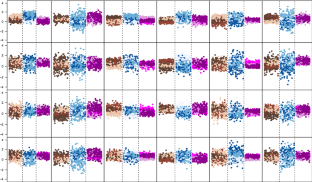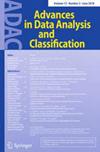张量变量时间序列数据的有限混合隐马尔科夫模型
IF 1.3
4区 计算机科学
Q2 STATISTICS & PROBABILITY
引用次数: 0
摘要
随着计算能力和数据存储能力的迅速提高,对高维度数据建模的需求也在增加,例如在张量变量框架中,每个观测值都被视为一个三维对象。本研究为张量变量时间序列数据建立了有限混合隐马尔科夫模型。模拟研究表明,该模型对集群和系统 ID 的分类准确率都很高。为了进一步验证所提模型的实用性,我们将其应用于现实生活数据,并取得了可喜的成果。本文章由计算机程序翻译,如有差异,请以英文原文为准。


Finite mixture of hidden Markov models for tensor-variate time series data
The need to model data with higher dimensions, such as a tensor-variate framework where each observation is considered a three-dimensional object, increases due to rapid improvements in computational power and data storage capabilities. In this study, a finite mixture of hidden Markov model for tensor-variate time series data is developed. Simulation studies demonstrate high classification accuracy for both cluster and regime IDs. To further validate the usefulness of the proposed model, it is applied to real-life data with promising results.
求助全文
通过发布文献求助,成功后即可免费获取论文全文。
去求助
来源期刊

Advances in Data Analysis and Classification
STATISTICS & PROBABILITY-
CiteScore
3.40
自引率
6.20%
发文量
45
审稿时长
>12 weeks
期刊介绍:
The international journal Advances in Data Analysis and Classification (ADAC) is designed as a forum for high standard publications on research and applications concerning the extraction of knowable aspects from many types of data. It publishes articles on such topics as structural, quantitative, or statistical approaches for the analysis of data; advances in classification, clustering, and pattern recognition methods; strategies for modeling complex data and mining large data sets; methods for the extraction of knowledge from data, and applications of advanced methods in specific domains of practice. Articles illustrate how new domain-specific knowledge can be made available from data by skillful use of data analysis methods. The journal also publishes survey papers that outline, and illuminate the basic ideas and techniques of special approaches.
 求助内容:
求助内容: 应助结果提醒方式:
应助结果提醒方式:


